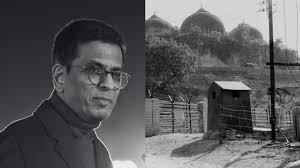Former Chief Justice of India (CJI) DY Chandrachud on Thursday said that the Supreme Court’s Ayodhya judgment was decided on the basis of evidence and legal principles, not faith, while also clarifying his recent remarks on the Babri Masjid that sparked controversy. Speaking at the India Today Conclave in Mumbai, Chandrachud addressed the row over his reported comment that the “erection of the Babri Masjid was a fundamental act of desecration.” He said his words had been lifted out of context, leading to a misinterpretation of his views on the Ayodhya dispute. “What is happening on social media is that people lift one part of the answer and combine it with another part, completely removing the context,” the former CJI explained.
Chandrachud, who was part of the five-judge bench that unanimously cleared the way for the construction of a Ram temple at the disputed site, emphasised that the verdict was the result of exhaustive scrutiny of evidence.
“The judgment was 1,045 pages long because the case record was over 30,000 pages. Most people who criticise it have not read the judgment. It is easy to post opinions on social media without reading the full document,” he said. The former CJI underlined that historical facts formed part of the evidence considered by the court and could not be ignored.
On judicial independence and public perception
Chandrachud expressed concern about how judicial independence is increasingly viewed through a binary lens on social media.
“Unless a judge decides every case according to a netizen’s ideological view, they are not considered independent. Independence is also seen as only deciding cases against the government. But if you decide even one case in favour of the government, you are called pro-government,” he said.
He cited landmark rulings that went against the government, including the electoral bonds case, the Aligarh Muslim University minority status case, and the Aadhaar verdict.
On prayer, neutrality, and personal belief
Responding to a question on whether a judge’s admission of prayer before delivering a ruling could undermine judicial neutrality, Chandrachud said personal spiritual practices only help in maintaining balance. “Every day, judges enter a zone of conflict. I pray or meditate each morning to bring peace and equilibrium to my work,” he said, adding that during his tenure he recited the Navkar Mantra daily, visited a dargah while serving in Allahabad, and attended church services in Goa.
He stressed that private belief and prayer were constitutionally protected rights and do not affect judicial fairness.
“My belief allows space for others to believe differently. There is nothing wrong in quiet reflection or prayer that helps a judge do justice with an even hand,” he said.



